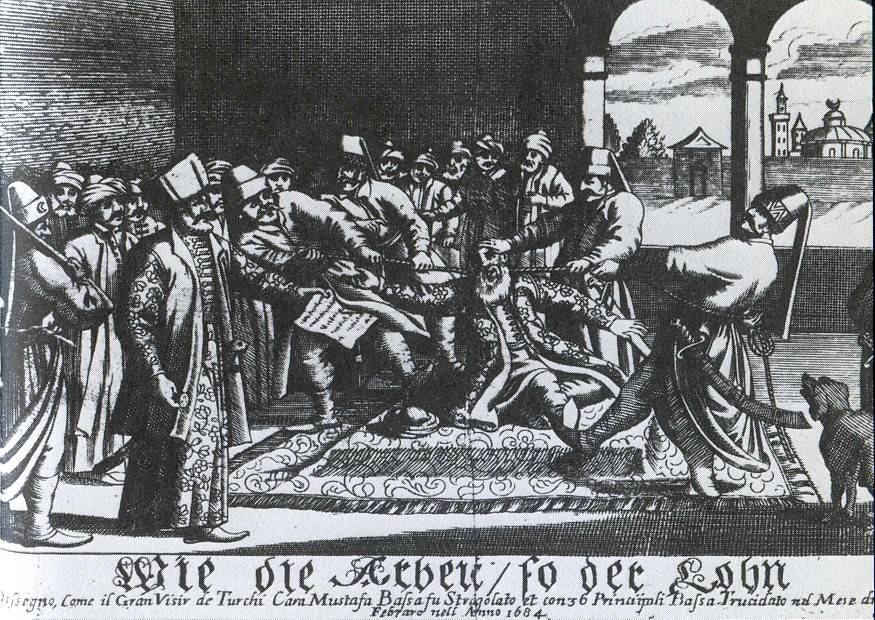Is history always written by the victors?
score:71
"History is written by victors" may itself be an example of history written by the losers! While the quote is commonly misattributed to Winston Churchill, it's origins are unknown and it might be inspired by Hermann Göring's quote:
We will go down in history either as the world's greatest statesmen or its worst villains.
On a (perhaps) more serious note, the aftermath of the Fall of Constantinople (1453) is a prime example of history written by the losers. A wave of Greek scholars emigrated to the west after the event that essentially marked the end of the Byzantine Empire, bringing with them extremely biased accounts of Ottoman brutality. The vilification of the Ottomans was the prevalent opinion in the Western world for centuries and served as propaganda material as late as 1832, when the Greek War of Independence ended. Even modern attempts at identifying the historical truth of the era, such as the 2011 "1821" documentary, are met with controversy in Greece.
A more recent example would be the American Civil War and the Lost Cause movement, a term borrowed from Edward Pollard's 1866 book The Lost Cause: A New Southern History of the War of the Confederates : Comprising a Full and Authentic Account of the Rise and Progress of the Late Southern Confederacy--the Campaigns, Battles, Incidents, and Adventures of the Most Gigantic Struggle of the World's History.
Lastly, a (perhaps controversial) example of history written by the losers is the account of the Vietnam War. Although whether the US lost the war is debatable they certainly didn't win it, still the overwhelming majority of historical documentation for the war comes from the US.
Further reading:
- Michel Foucault's Society Must Be Defended (Lectures at the Collège de France, 1975-76)
- Thomas Carlyle's On Heroes and Hero Worship and the Heroic in History,
- Social history and People's history articles on Wikipedia,
- Philosophy of history article on Wikipedia,
- Truth by consensus article on Wikipedia,
- Historical revisionism article on Wikipedia,
- History written by the losers article on The Guardian.
Upvote:0
Japan lost World War II, and Japanese people write the textbooks for its history, including World War II, for Japanese schools.
Upvote:1
The Battle of Thermopylae is completely written by losers. (All citations from the Wikipedia article)
First of all, the first myth about this battle is that there were only 300 defenders, but in fact there were at least 20 times more.
Secondly, the legend says that all but one of them died, but losses were about 4000.
Third, it was not a clear strategic success of the Greeks.
(...) within the context of the Persian invasion, Thermopylae was undoubtedly a defeat for the Greeks. It seems clear that the Greek strategy was to hold off the Persians at Thermopylae and Artemisium; whatever they may have intended, it was presumably not their desire to surrender all of Boeotia and Attica to the Persians. (...) the last stand at Thermopylae was a successful delaying action that gave the Greek navy time to prepare for the Battle of Salamis. However, compared to the probable time (about one month) between Thermopylae and Salamis, the time bought by the last stand at Thermopylae was negligible.
Fourth, it was not a high-losses win of Persians (although they lost much more soldiers than Greeks):
there is no suggestion by Herodotus that this was the effect of the Battle of Thermopylae on the Persian forces. Furthermore, this idea ignores the fact that the Persians would, in the aftermath of Thermopylae, conquer the majority of Greece, and the fact that Persians were still fighting in Greece a year later.
Upvote:4
Howard Zinn, in his A People's History of the United States, claimed to be endevoring to do something quite similar to that.
If you are interested in USA history, I highly reccomend it for two reasons. The first is that many others with that same interest will be familiar with it, so you can at least hold your own in conversations. The other is that it gives the best coverage of the (typically ignored) union movement in US history that I have seen. This was arguably the defining social issue of the late 19th and early 20th century. It is tough to understand the events of this period without it, yet most other US history books practically pretend it didn't happen.
I understand there is also from another author A People's History of the World, written in the same vein.
Upvote:4
An interesting article in History Today by Katherine Weikert is devoted to this very topic. The three examples studied in depth are:
- Byrhtnoth, the Saxon leader who lost - and was killed in - the battle of Maldon. Nevetheless, he is the subject of an Old English poem which glorifies his valour; he is also praised in the Ely chronicle. As Dr. Weikert explains, the fact that both Byrhtnoth and his widow were, to use a modern term, major donors for the Church institutions in Ely, must have helped a lot.
- Harald Hardrada
- King Harold.
I do recommend reading the article, it's very enlightening - and available for free.
Upvote:7
If you are looking for examples: The history of most major invasions of Europe is written or significantly influenced by the Europeans (who happened to be on the loosing end). The Huns and Attila, the Mongols, the Vikings (OK, they are European, too), the Ottoman Turks; even if there is a significant body of information (e,g in case of Ottoman Empire), the history is heavily dominated by the stories of the European side.
This is similarly true for Chinese history: China was beaten many times and conquered by their northern neighbors, who even gave several dynasties to them. Yet I see more Chinese accounts of the events than Manchurian or Jurchen.
Upvote:8
The Spanish Civil War is an example of loser-dominated historiography. That the Rebels won is beyond doubt, but the Loyalists wrote all the history... it's hard to think of a history of the war which is sympathetic to the winning side.
Upvote:9
I am reading Andrew Weatcroft's's The Enemy at the Gate: Habsburg, Ottomans, and the Battle for Europe (see also here). It contains this relevant statement in relation to a (from some perspective) loosing party rewriting history:
Of course, once the great [Ottoman attack on Vienna in 1683] failed, history was rewritten and the sultan portrayed as wisely dubious from the outset and latterly wholly innocent of his duplicitous servant's machinations.
That servant was Kara Mustafa, Grand Vizier of the Ottoman Empire under Sultan Mehmet IV, who survived the battle in the remote West but not its aftermath closer to home: he was strangulated on orders from the sultan, his co-loser in (and according to this source perhaps the co-initiator of) the failed campaign.

Upvote:10
The entire Bible is pretty much written by the losers of history, written from the perspective of the Hebrew slaves, the prophets, and the exiles, rather than the Pharaoh, the king, and the conquerors, respectively. Egypt, Assyria, Babylonia, Persia, the Greeks, and the Romans all had their empires, but the perspective was taken from a particular people who lived under the control of these empires. In the Greek New Testament the early followers of Jesus took those identities on themselves as well. Unfortunately, the Christians became major oppressors a few centuries after that. Some of us who are sticking with the church are working to undo that false (but long) step.
Upvote:17
The Arab-Israeli conflict. The Arabs lost to Israel in 4 wars (1948, 1967, 1973, 1982) but their version of history is the most accepted today (even the universal acceptance of the term "Palestinian people"). Thus Israelis are portrayed "colonizers", Zionism was portrayed as racism in the UN, and Israel as an apartheid state. This while Israel is the historical homeland of the Jewish people (recognized by the league of nations 1922), Jews are depicted as pigs all over the Arab world, and Israel is the only country in the Middle East in which Arab citizens have basic human freedoms.
Upvote:17
Here are some other examples:
The US Civil War. Much of the history was driven by the South's need to justify itself especially after the first 20 years up to about 1960 or so.
The Fall of the Roman Republic Virtually all of the surviving histories were written by the conservative factions of Rome and not by the Caesarian side. Augustus didn't mind that much as it let the elite blow off steam while he ran things as suited him.
Upvote:25
An important example from ancient history is the Peloponnesian war. The most important account of it comes from Thucydides, "the father of history". Thucidydes was an Athenian, and Athens lost the war. I am not aware of any Spartan accounts of this war that survived.
Upvote:41
All the bad press given to Vikings (and the like) by angry monks suggests not always. Depends if the victors build a tradition of literacy and of documenting history or whether they just go build more longboats and get drunk.
More post
- 📝 What is the difference between "diallektes" and "aesymnetes"?
- 📝 Did the Germans invent "Unexpected Pot-Shots"?
- 📝 Why was Archbishop of Carthage, Cyriacus, arrested?
- 📝 Which was the earliest book of names for naming babies?
- 📝 What was Hitler's attitude towards the Aryans of India?
- 📝 Underground Tunnels in New York City and Boston
- 📝 Why is Jackson's valley campaign considered a Confederate victory?
- 📝 Are there registers of the scores and participation in ancient Olympic games?
- 📝 Why did English become Lingua Franca of the modern world?
- 📝 Did the Zone Rouge in France and Belgium make a difference in WWII?
- 📝 What is the current academic consensus on Charlemagne's genealogy?
- 📝 Why does the monarchy of Belgium still exist after Leopold 2?
- 📝 Did a kamikaze ever impact the hull of a ship, as opposed to the deck?
- 📝 What was the heaviest example of horse armor (barding) from 16th and 17th centuries?
- 📝 Did Roman statutory law in the 1st century allow for crucifixion of non slaves?
- 📝 Who was Charles Kingston O'Mahony?
- 📝 Why are the Portuguese so obsessed with salted codfish?
- 📝 Did the Spartans really taunt Philip II of Macedon with a single word?
- 📝 How extensive and developed was the ancient Kushite (Nubian) horse trade?
- 📝 Does somebody know anything about the original "Tour de Croy" tower?
- 📝 How was library classification done in English-speaking libraries prior to the 19th century?
- 📝 How were back copies of newspapers viewed in England in 1923
- 📝 What sort of temples existed in small Greek villages?
- 📝 How did lay people understand logic in the Greco-Roman world?
- 📝 What if a slave entered a state without slavery?
- 📝 Primary sources from Umayyad times
- 📝 Military Strategy of Carnot
- 📝 Identify WW2 ammo
- 📝 Did Catherine Howard use some form of birth control?
- 📝 The name of a German Nazi supporter who owned many newspapers
Source: stackoverflow.com
Search Posts
Related post
- 📝 Is history always written by the victors?
- 📝 Is there a written history on the Sonderkommando Elbe?
- 📝 Has anyone written Australian history from the perspective of the original inhabitants - the aborigines?
- 📝 Has anyone written a history centered on predictions/expectations about the future?
- 📝 Is the word God (or it's equivalent) always as old as the civilization's earliest written texts?
- 📝 Which year in history had the highest ratio of non-natural deaths?
- 📝 Why was PTSD not written about as much before the 20th century?
- 📝 What is the historical basis for the claim that "Taiwan has always been part of China"?
- 📝 How likely it is that a nobleman of the eighteenth century would give written instructions to his maids?
- 📝 What was the first battle in history fought by vast-majority-% "distance-shooting" non-mechanized force?
- 📝 Is black American history only about segregation, slavery, and the 3 people you get taught about in school?
- 📝 Japan is known for being isolationist, so what cultivated its history of interventionism in the 20th century?
- 📝 Does the Catholic church have a long history of child abuse, or is it something that started in our time?
- 📝 What is the history of the popped collar?
- 📝 Were Shakespeare's plays written for "high culture" or "entertain the bawdy masses" during his time?
- 📝 What is the history of the university asylum law?
- 📝 Does Chinese history really span the past 5000 years?
- 📝 Was Mid-Night always considered the transition point between two days in Gregorian/Julian Calendars?
- 📝 What is the history of the check mark / tick mark?
- 📝 How is the discipline of History differentiated from other disciplines in social sciences or the humanities?
- 📝 Can history shed any light on the "secret arts" of the Egyptian magicians who turned their staffs into serpents as claimed by Exodus 7:11-12?
- 📝 How aware were the latter Greek-speaking Romans (ERE: Byzantines) of the early history of Rome?
- 📝 What do I need to know about Syria's history to understand the 2011-2012 uprising?
- 📝 How can I properly learn the history of a country whose language I don't speak or read?
- 📝 Which single-car accident in history caused the most deaths?
- 📝 Why do all my history books divide Chinese history after the Han dynasty?
- 📝 Why has there only been one dynasty in the history of Japan?
- 📝 Why did World War I victors let Germany pay reparations in German Marks and gave it the option to default via inflation?
- 📝 Is there a definition of history separate from the definition of politics?
- 📝 What was the primary motivation for a historical figure like Xenophon to create an extensive collection of written material?




